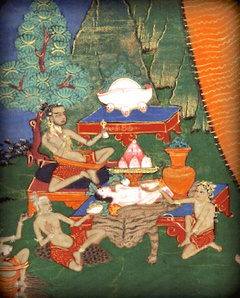Tsok
English (38) | Deutsch (3) | Español (3) | Français (9) | 中文 (9) | བོད་ཡིག (37)
Lotsawa House présente les textes suivants liés à la pratique du tsok (tshogs) ou de la fête (Skt. gaṇacakra):
Introduction
Explication
Offering Liturgies
Prières
par
Dudjom Rinpoché
par
Jigmé Lingpa
par
Longchen Rabjam
par
Mipham Rinpoche
L’Excellent vase de la splendeur : Offrande de tsok accompagnant la prière adamantine en sept lignes
par
Mipham Rinpoche
